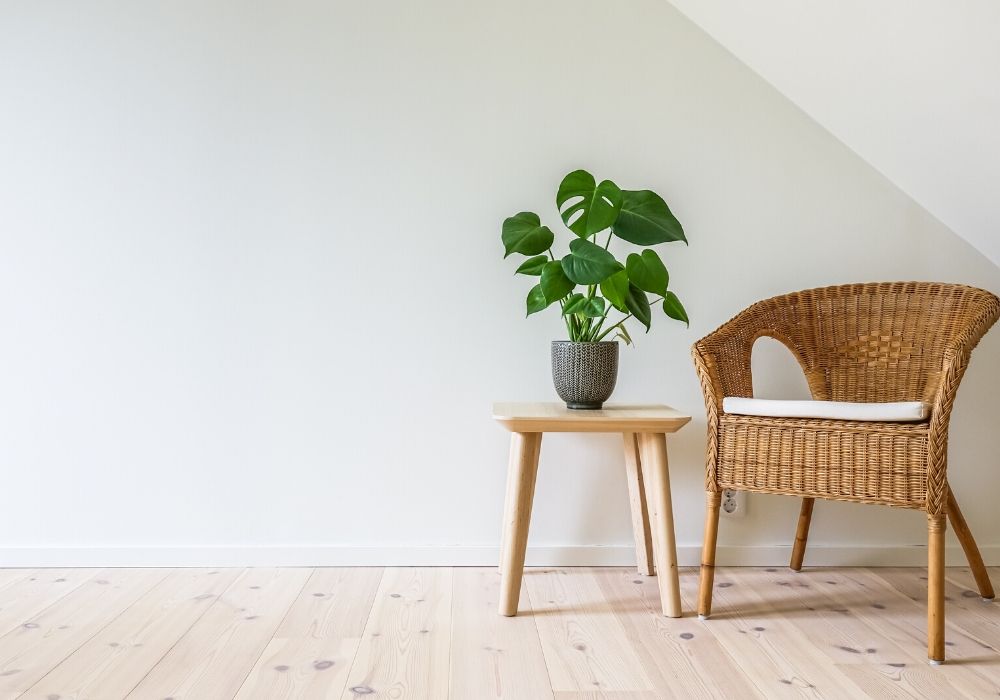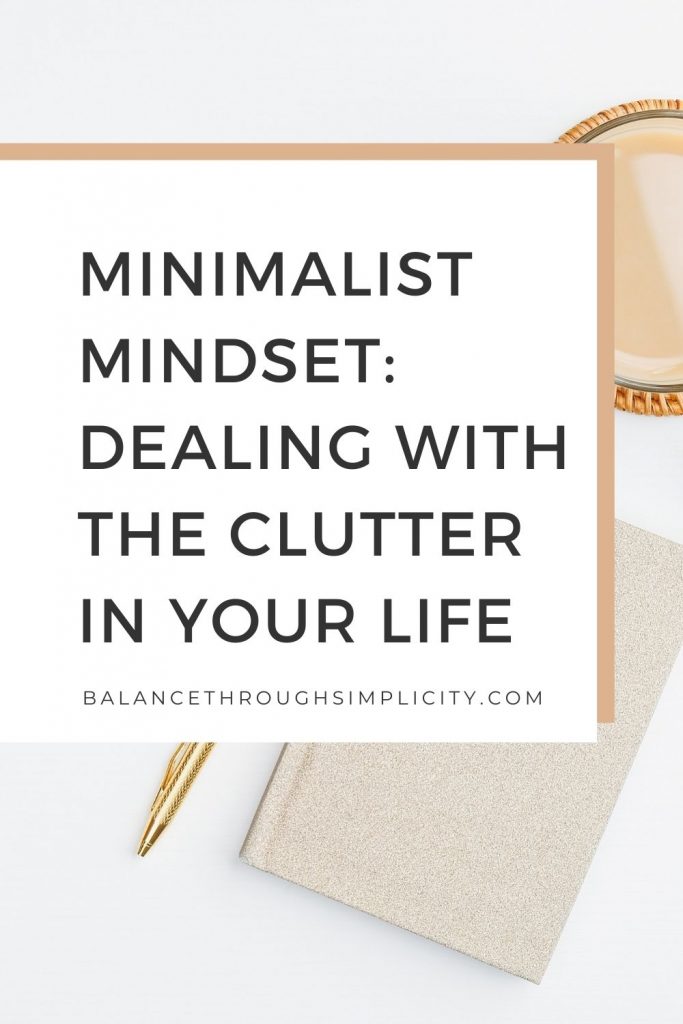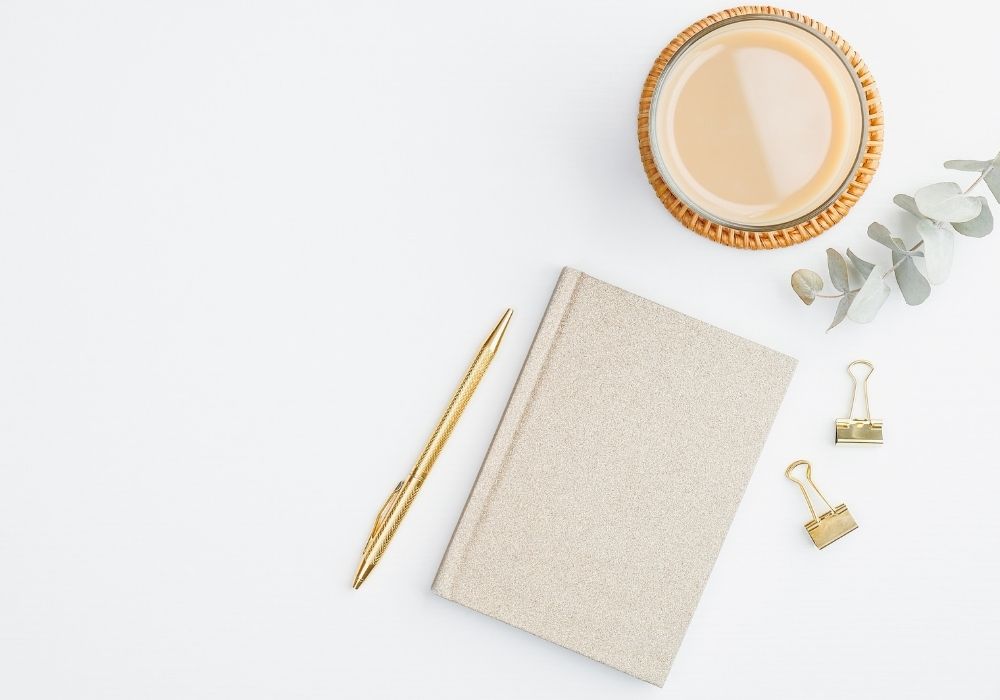THE MINIMALIST MINDSET: HOW TO THINK LIKE A MINIMALIST
Minimalism is a lifestyle choice encouraging you to clear the clutter from your life so you can focus on your priorities and the things that really matter to you, in your home, schedule, heart and mind. In this post I explain my interpretation of the minimalist mindset and how to think like a minimalist.
WHAT IS MINIMALISM?
My favourite definition of minimalism is from Joshua Becker of becomingminimalist.com…
“Minimalism is the intentional promotion of the things we most value and the removal of anything that distracts us from it.”
As you read this article, I encourage you to keep this definition in mind.
The minimalist lifestyle that I like to share reflects the values and principles in this definition. I don’t believe that minimalist living is about bare white walls, sticking to a certain number of clothes and never buying anything new. It can be if you want it to be, but honestly, I’d struggle to live like this and I think many others would too!
Instead, I like to talk about and live a gentle, compassionate and heart-centred approach to minimalism. Whilst it is about having less stuff, it’s also thinking differently about the value you place on that stuff in your life.
What’s important in life might vary from person to person and it might also change over time, but the practice of being mindful and intentional about what we have in our life (in all its shapes and forms) is a great place to start.
If you’re new to minimalism and would like a more in-depth understanding of what minimalism is (and perhaps how to get started for yourself), I invite you to check out the following posts:
- What is Minimalism: an introduction to Minimalist living
- 7 easy ways to become Minimalist
- What is minimalism and a few things it’s not!
YOUR RELATIONSHIP WITH STUFF
To understand and experience the benefits of minimalism and make it sustainable for you and your family over the long term, you need to change the way you think about the stuff in your life.
I don’t just mean your physical stuff, but diary appointments, negative thoughts, unhelpful habits, unsupportive relationships, debt, stress and anything else that fills (and distracts) your schedule, heart, body and mind without adding value to your life in some way.
How you think about the clutter in your life and the intentional steps you take to reduce or eliminate it from your life on a daily basis may be difficult at first. It may feel overwhelming, unrealistic or just hard work. Again, for honesty sake, I’d better admit that simplifying life isn’t simple in itself!
Over time, as you make slow, steady steps and gradually peel away the layers of clutter in your life (like you peel away layers of an onion), making these intentional decisions will become intuitive and second nature.
This awareness and shift in your thinking is when you start to think like a minimalist – with a minimalist mindset.
WHY WE FILL OUR HOMES AND LIFE WITH STUFF
So then, if clutter isn’t always so good for us (read some of the research here), why then do we let clutter build up? There are many reasons why, but here are some examples…
- Do you keep your stuff because it really adds value to your life, either because you love it or need it? Or, do you have most of your stuff because it’s just built up over time and you’ve never really thought about the how and the why? Maybe you haven’t asked the right decluttering questions or you’re suffering from clutter blindness?! Clutter builds up without us noticing.
- Do you clutter your schedule like you overstuff your home? Do you say yes to things that aren’t important because you like the sound of being busy, not sure what you’d do with your free time, or worried you might miss out on something special going on? Clutter makes us feel valued or that our life is fulfilling.
- Do you shop and spend too much? We get tempted by the sales, sharp marketing tactics or as a quick-fix reaction to feeling bored or stressed. Then we wonder why our wardrobes are stuffed and our bank accounts are drained. Clutter can have an emotional cause or connection.
These are just a few examples of why our homes and lives become cluttered and busy. As you can see, it’s not because we never throw anything away or we’re lazy and don’t tidy our homes. Clutter can be a by-product of a busy life or the sign or symptom of another, wider problem.
Clutter takes many forms and for just as many causes. That’s why it’s easy to fill our homes and lives with stuff without realising. Until, of course, we become aware of it and begin to think like a minimalist!

TRADE-OFFS AND VALUE
As you’ve been reading this article, you may be reflecting on the clutter in your own life. Is it too many clothes in your closet, gadgets on your kitchen counter, apps on your phone?
Another way of identifying the clutter in your life is to consider the value you place on your stuff. Most things in life come with a trade-off. If you have a small place for books on your bookshelf, which books will you keep and which will you get rid of? If you say yes to one activity tomorrow afternoon, it means saying no to something else (even if that’s free time doing nothing).
Decisions have consequences and trade-offs and dealing with the clutter in your life is no different. But, knowing the value you place on your stuff and what happens if you don’t have space, time or energy for it, will help you understand whether that clutter is actually clutter or whether it’s important.
Here are some practical examples…
- Do you value those ornaments on the shelf more than the time it’s taken you to clean and tidy them?
- Do you value those new shoes you bought even though it took far, far longer to earn the money to afford them than it took for you to buy them?
- Do you waste your time scrolling through social media or would it be more rewarding in the long-term to be spending time and energy enjoying your own life rather than looking at other people’s?
The value you place on your stuff isn’t only about its material worth. It’s also about the cost or the trade-off in other ways. Your time, energy, motivation, your goals, your personal growth, self-care, relationships.
We can’t have everything in life so we prioritise and make choices:
- Is it this or that, one way or the other?
- What lifts you up on the inside, what makes your heart sing and your body to jump out of bed each morning ready for the day vs what brings you down, stresses you out and weighs heavy on your body and mind.
- What brings joy, peace, happiness and growth. Does the stuff you buy and own or the space on your schedule and in your day allow space for these?
These are all pretty good non-monetary measures of what adds value to your life. When and how you think about them is all part of having a minimalist mindset.

EXAMPLES OF HOW TO THINK LIKE A MINIMALIST
Here are some practical examples of minimalist thinking to embrace a simplified and decluttered home and life.
1. Minimalist shopping habits
In the words of Francine Jay, “Minimalism is asking why before you buy.” It’s certainly not about never going shopping, but a minimalist mindset encourages you to shop intentionally wherever possible. Read this article for more minimalist shopping tips.
2. Decluttering your home
Creating a peaceful, easy-to-manage home that supports those that live in it is at the heart of the minimalist mindset. It’s about choosing to own less stuff, have less stuff to manage and take up your time to give you freedom to do other things instead. Read these reasons to own less stuff.
3. A decluttered schedule
You can declutter your schedule to create space just like you would declutter your home. Choose how busy you are, how much wiggle room you leave yourself and what commitments you say yes and no to. Factor in some downtime and clear blocks of time for rest, relaxation and pursuing your interests. Read more about how to be less busy.
4. Aligning your priorities with every day life
Do you have space (mentally and physically) to follow your interests and heart or are you always chasing your tail and tackling that To Do list? Do the things that you do every day align with what you want and hope for your life now and in the future or do you feel that you’re on autopilot? Are you so caught up in getting through the day that you don’t have scope to look at the bigger picture? Define your priorities and what’s important to you and align your daily life to honour those priorities. Read these tips on how to define your priorities in life.
5. Follow your own path
Much like with the shopping habits we talked about earlier, a minimalist lifestyle is about questioning why. Don’t do things because everyone else is doing them, they’re popular or you feel ‘should’ be doing them. Ask why, listen to your heart, be present, connect with yourself where ever possible and find ways to be content with yourself, your days and the little things in life. I think these elements are essential to a minimalist mindset. They help you simplify and remove the excess to reveal what’s really important in your life and to you. After all, minimalism is about so much more than just stuff.
WHY IS A MINIMALIST MINDSET IMPORTANT?
We’ve looked at what the minimalist mindset is all about and some examples of how it can support you to live a simpler, clutter-free and intentional life. But, why is it important for the long-term? Why is it important to keep thinking like a minimalist, rather than just while you’re decluttering your home and getting rid of a few things?
Clutter creeps in despite our best efforts to keep it out! Think of the daily post, your email inbox, advertising on TV, packaging on food items, the little collections of rocks and twigs in your child’s pocket at the end of the day, the errands you’re remembering to run and the negative thoughts you may hold about your body and what you look like. There are so many ways in which clutter enters our lives. These are just a few examples.
Being aware of the clutter and doing something about it takes a real shift in thinking to be sustainable long-term. The minimalist mindset is about making regular mindful, intentional decisions to minimise the clutter that will, in time, become second nature.
Clearing the clutter from your life isn’t a do-it-once-and-you’re-done kind of project. Clutter invades our homes, schedules, hearts and minds in many different ways as we go through life. Instead of making minute decisions thousands of times a day about that clutter, a minimalist mindset will filter out most of these choices.
Instead, you’ll naturally gravitate to less stuff and more life, get clear on your priorities, align your life according to them, have healthy boundaries that shape your decisions and guard against incoming clutter which tries to throw you off course.
“Minimalism is the constant art of editing your life.” (Danny Dover)
Intentional editing so that your home, schedule, heart and mind are full of the important things (without the clutter). It’s about understanding how clutter makes you think and feel, rather than just the presence of clutter itself. Here are some gentle reminders about minimalism in case you need a recap!
This is the minimalist mindset and why it’s important – to help you find contentment in your everyday and fulfilment in your life.
MINIMALIST LIVING RESOURCES
Here are some helpful articles on the minimalist lifestyle:
- 3 gentle things to try if you’re not sure minimalism is for you – and they’re not to do with your clutter!
- How to create a minimalist home
- Minimalist lifestyle tips and how to embrace minimalist living every day
- Myths about minimalism (and what you need to know instead)
- What is clutter and 7 ways to think about your stuff
- Minimalism and happiness – does minimalism make you happier?
A WORKBOOK TO HELP YOU CLEAR CLUTTER IN YOUR OWN LIFE
If you’d like to explore a Minimalist lifestyle, the first step many people take is to declutter their homes. It’s a natural starting point to clear the physical clutter from your home environment and it’s where you can most quickly see and feel the benefits of a clutter-free space that offers more calm and peace.
My Declutter Starter Kit can help you do this. It’s packed with helpful tips and decluttering projects plus advice on what to do if you get stuck or don’t have much time.
Pop your details in the box below to get started right now…

